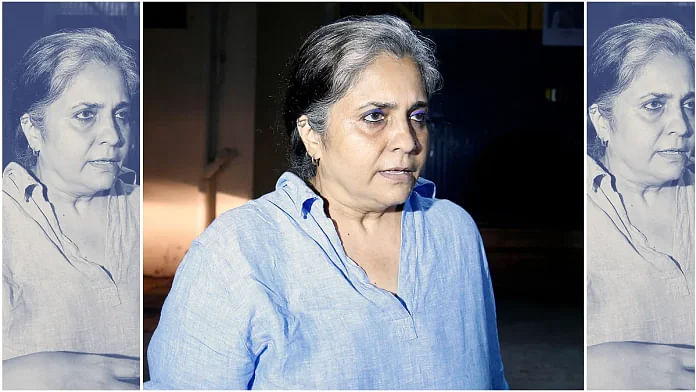New Delhi: The Supreme Court Wednesday granted bail to social activist Teesta Setalvad who is facing charges of falsifying evidence in a 2002 post-Godhra riots case — a move that reverses the Gujarat High Court’s 1 July ruling that ordered her surrender immediately.
A three-judge bench led by Justice B.R. Gavai quashed the Gujarat HC’s ruling, which it called “perverse” and “contradictory”. It also raised questions over the state’s assertion that the activist was facing “serious and grave charges”, saying use of Section 194 of Indian Penal Code (IPC) in the First Information Report (FIR) against her is “suspect.”
Section 194 deals with giving or fabricating false evidence with intent to procure conviction of capital offence.
Setalvad has been accused of falsifying evidence and tutoring witnesses to claim that senior Gujarat officials, including then Gujarat chief minister Narendra Modi, were behind the 2002 communal violence.
“There is self-contradiction in the (HC) order and we cannot ignore it. If the observations of the learned judge are to be accepted, no application for bail can be accepted unless the accused files for quashing of the proceedings (case). To say the least, the findings are perverse,” the bench told Additional Solicitor General (ASG) S.V. Raju, who opposed the bail.
The SC order came on the activist’s appeal against the Gujarat HC’s 1 July order, which, following a dramatic turn of events, was stayed by the Supreme Court the same day at a late evening hearing.
During the hearing, Justice Gavai’s bench even raised questions, albeit verbally, over a 2022 Supreme Court judgment that became the basis for Gujarat Police’s evidence tampering case against Setalvad.
Delivered in June last, the judgment had dismissed the petition of Zakia Jafri, the wife of Ehsaan Jafri, a Congress leader who was killed in the 2002 post-Godhra riots. In her petition, Zakia had challenged a Special Investigation Team’s (SIT) report that discarded her and Setalvad’s claim on Modi’s alleged involvement in the larger conspiracy behind the 2002 riots.
The bench led by Justice Gavai said that the observations in the June 2022 judgment were made without letting Setalvad respond to the allegations, adding that while the activist wanted to intervene, her request had been denied.
“Rule of law also includes principles of natural justice,” the bench said, noting that Setalvad’s custody was no longer required since the charge sheet in the case had already been filed.
The court, however, told Setalvad to not influence any witnesses and also gave the prosecution the liberty to approach the Supreme Court directly for cancelling bail, in case its conditions are violated.
Also Read: ‘No direct evidence’ against accused — why Gujarat court acquitted 35 in 20-yr-old Godhra riots case
Contradictions in HC ruling, seriousness of crime
On 25 June 2022 — a day after SC bench’s ruling on Jafri’s appeal— the Ahmedabad Detection of Crime Branch registered an FIR against Setalvad, former Gujarat police chief R.B. Sreekumar and former IPS officer Sanjiv Bhatt.
In that ruling, the three-judge bench led by Justice A.M. Khanwilkar (now retired) observed that those who “kept the pot boiling…for ulterior design” should be put “in the dock”.
Soon after this, Setalvad was taken into custody, where she remained until the Supreme Court released her on interim bail last September.
On 1 July, rejecting Setalvad’s plea for a regular bail, the Gujarat HC accused the activist of trying to “implicate the then chief minister (and now Prime Minister Narendra Modi) and higher officials of the state government and top leaders of the BJP”, according to media reports.
Setalvad appealed the ruling to the Supreme Court the same day. After a division bench of the apex court failed to give a unanimous order, it was referred to the same three-judge bench that gave the Wednesday ruling. That bench held a hearing the same night and gave her interim protection from arrest.
At the Wednesday hearing, the three-judge bench noted a “self-contradiction” in the Gujarat HC judgment. According to the judges, while the HC had on the one hand said it wasn’t necessary at the bail stage to consider if there’s a prima facie case, it had, on the other, gone on to discuss some witness statements to say that a prima facie case had been established.
In addition, the bench also quoted the HC as observing that Setalvad can’t argue that there was no case against her since she had challenged neither the FIR nor the charge sheet.
“The limited understanding of law we have is that the considerations, which are required to be taken into consideration for grant of bail are (whether) a prima facie case (is made out); the possibility of the accused tampering the evidence of influencing the witness and fleeing away from justice. The other considerations are gravity and seriousness of the offence,” the bench said, adding that every student of law “knows what are relevant considerations for bail”.
In his arguments, ASG Raju told the court that the police did not take action before the 2022 SC judgment because the case was subjudice. Asked what investigation the police did in 24 hours between the ruling and the filing of the FIR, he said that the case was registered on SIT’s findings.
On Section 194 of the Indian Penal Code, the court wanted to know if any of the deponents who signed the alleged false affidavits had been arrested too. “Initially, we were feeling that there was a case made out under section 194. But now even 194 is suspect,” it said.
It also brushed aside the ASG’s contention that Setalvad was involved in a serious offence saying it was punishable “with only three years”.
“Is she wanted in a murder case,” the bench quipped when ASG Raju claimed Setalvad has criminal antecedents.
(Edited by Uttara Ramaswamy)
Also Read: Victimisation, bad mahaul, Hindu-Muslim bond: Bilkis convicts try to push claims of innocence



